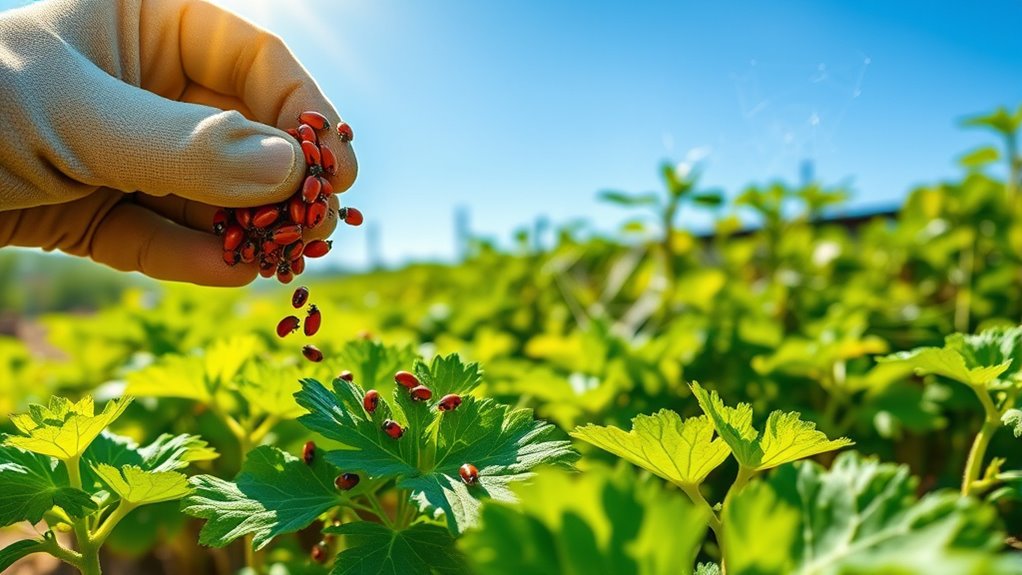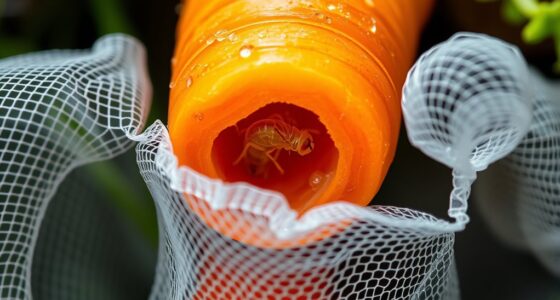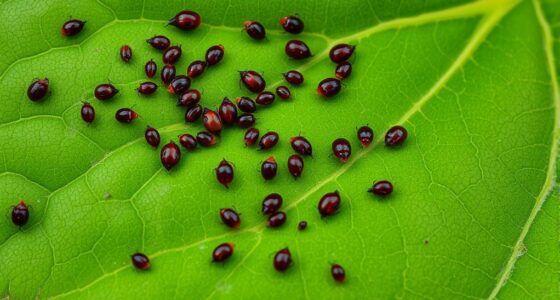To manage Colorado potato beetles organically, monitor your plants regularly and remove beetles, larvae, and eggs by hand. Use physical barriers like row covers, and consider trap cropping or pheromone traps to catch adults early. Incorporate beneficial insects such as lady beetles and lacewings to naturally control populations. Practice crop rotation and enrich your soil with organic amendments to boost plant health. Stay proactive—there’s more effective methods to keep these pests at bay naturally.
Key Takeaways
- Use trap cropping and pheromone traps for early detection and targeted organic control of beetle populations.
- Regularly inspect plants and remove beetles, larvae, and eggs by hand, dropping them into soapy water.
- Incorporate beneficial insects and predators, such as lady beetles and lacewings, to naturally reduce beetle numbers.
- Apply organic sprays like neem oil or pyrethrin during early morning or late evening for quick beetle knockdown.
- Practice crop rotation, enrich soil with organic amendments, and maintain plant health to disrupt pest lifecycle and prevent infestations.
Monitoring and Early Detection Strategies
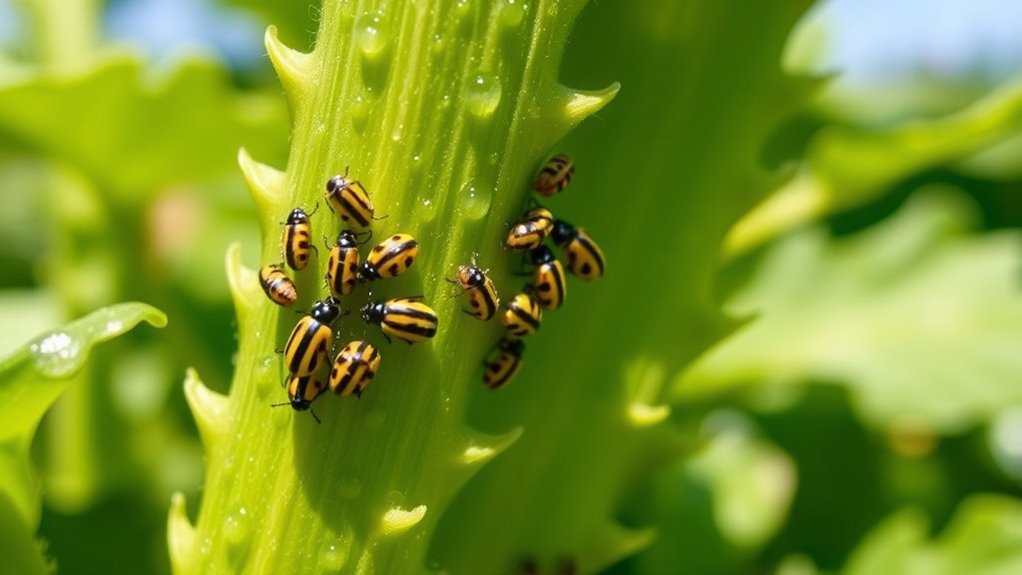
How can you catch Colorado potato beetles early before they cause serious damage? The key is proactive monitoring using trap cropping and pheromone traps. Trap cropping involves planting a sacrificial crop nearby that attracts beetles, making it easier to spot infestations early. Pheromone traps emit synthetic sex scents that lure adult beetles, helping you detect their presence before they spread. Regularly inspecting trap crops and monitoring pheromone traps can alert you to beetle activity days or weeks before they reach damaging levels. This early detection allows you to take timely, organic control measures, preventing widespread damage. Combining these strategies ensures you stay ahead of the pests and protect your potato plants naturally and effectively. Understanding the role of tableware in agricultural settings highlights the importance of proper tools and monitoring equipment for effective pest management.
Handpicking and Physical Removal Techniques

Handpicking and physically removing Colorado potato beetles is one of the most straightforward and immediate organic control methods. Each day, inspect your plants closely, especially during peak beetle activity, and remove beetles, larvae, and eggs by hand. Drop them into a bucket of soapy water to prevent re-infestation. To make this process easier, incorporate companion planting—plants like marigolds or nasturtiums can repel beetles and attract beneficial insects. Mulching techniques also help by creating a physical barrier that discourages beetle movement and makes spotting pests easier. Regular monitoring combined with these practices can markedly reduce beetle populations. While time-consuming, handpicking is an effective, chemical-free way to protect your potatoes and promote a healthy, organic garden. Additionally, understanding the regional flavors and traditions can help you select plants and practices best suited to your local environment.
Using Row Covers and Physical Barriers

Using row covers and physical barriers offers an effective way to protect your potatoes from Colorado potato beetles without resorting to chemicals. To maximize physical barrier effectiveness, start with proper row cover installation—ensure covers are tightly secured at the edges to prevent beetles from sneaking underneath. Use lightweight, breathable fabrics that allow sunlight and water to reach your plants while blocking pests. Regularly check for tears or gaps and repair them immediately. Keep covers off during flowering to allow pollination, then reseal afterward. Physical barriers can markedly reduce beetle infestations, but only if installed correctly and maintained consistently. This proactive approach minimizes pest damage and keeps your potatoes organically grown and healthy. Incorporating integrated pest management strategies can further enhance your pest control efforts and promote sustainable gardening practices.
Incorporating Beneficial Insects and Predators
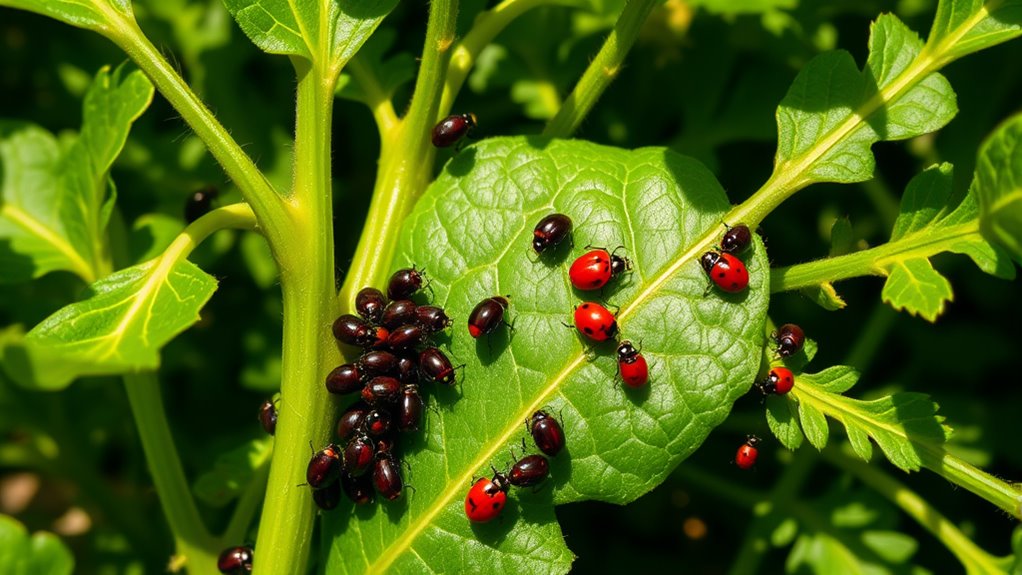
Incorporating beneficial insects and predators into your garden offers a natural and effective way to control Colorado potato beetles organically. By attracting pollinators, you encourage a balanced ecosystem that supports predator populations like lady beetles and lacewing larvae, which feed on beetle eggs and larvae. Creating predator habitats, such as planting flowering cover crops or maintaining diverse plantings, provides shelter and food sources for these helpful insects. This approach helps keep beetle numbers in check without chemicals. Focus on maintaining a healthy garden environment to support beneficial insects year-round. Properly managed predator populations can markedly reduce beetle infestations, making organic control more sustainable and environmentally friendly. Incorporate these practices, and you’ll foster a resilient garden ecosystem that naturally suppresses pest populations.
Applying Organic Sprays and Botanical Insecticides
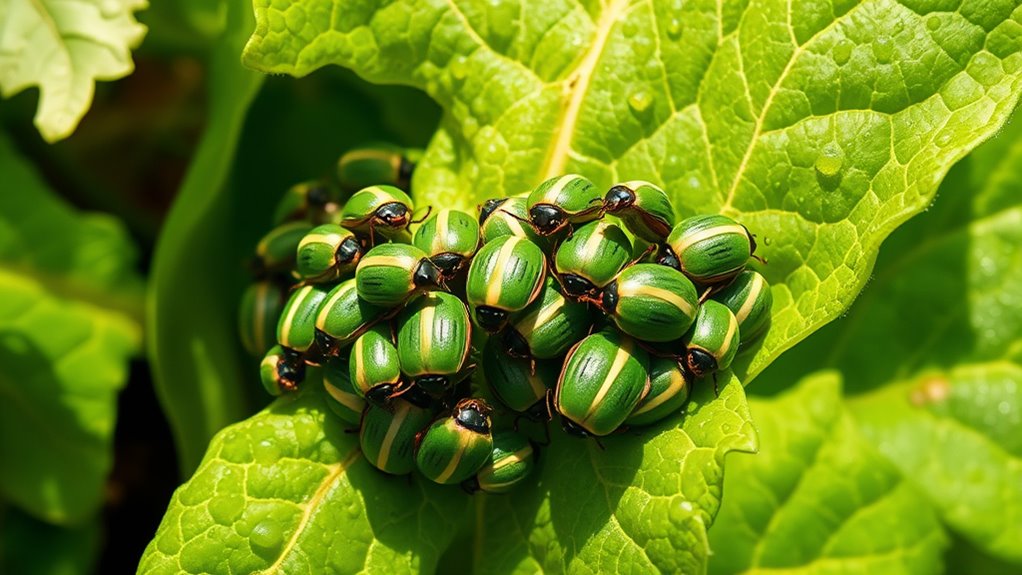
Applying organic sprays and botanical insecticides offers a targeted way to control Colorado potato beetles while minimizing chemical impact. These options allow you to treat infestations effectively without harming beneficial insects or the environment. When using botanical insecticides, you should consider the following:
- Choose products containing neem oil or pyrethrin for quick knockdown.
- Apply organic sprays during early morning or late evening to reduce drift.
- Cover both the tops and undersides of leaves thoroughly.
- Reapply as needed, especially after rain or heavy dew.
- Incorporate precision application techniques to maximize effectiveness and minimize non-target effects.
Botanical insecticides are generally biodegradable and safe when used correctly. Using organic sprays helps you manage beetle populations while maintaining an organic approach to your potato crop.
Crop Rotation and Cultural Practices
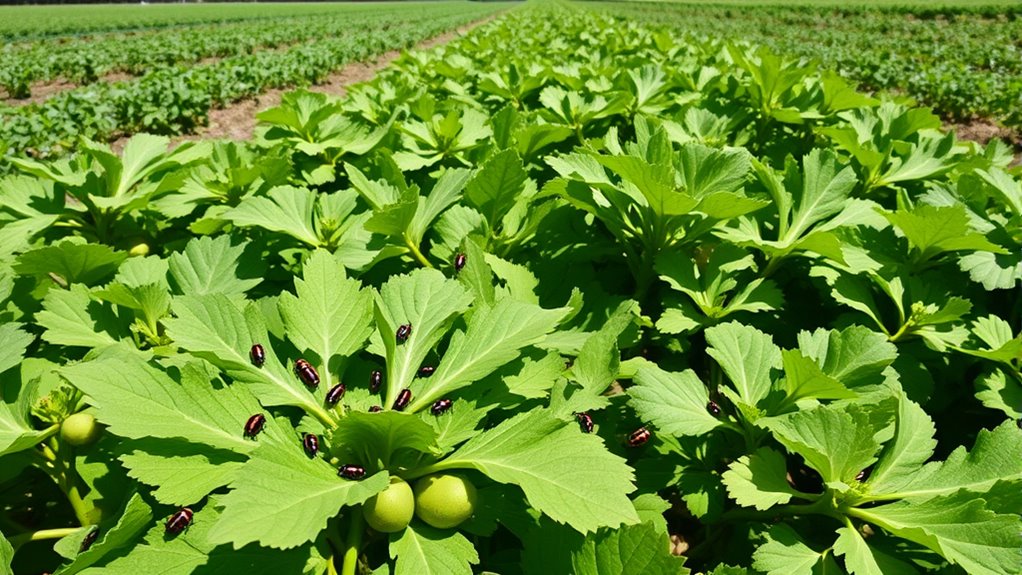
Crop rotation and cultural practices are essential tools for managing Colorado potato beetles organically. By rotating your crops, you break the beetles’ life cycle, reducing infestations over time. Avoid planting potatoes or related crops like tomatoes and eggplants in the same spot year after year. Incorporate companion planting by growing herbs like basil or tansy near your potatoes, which can repel beetles. Cover cropping also plays a crucial role; planting cover crops such as clover or buckwheat helps improve soil health and disrupt beetle habitats. These practices make your garden less attractive to pests and support natural pest control. Consistent crop rotation combined with strategic companion planting and cover cropping keeps Colorado potato beetle populations in check without chemicals. Additionally, understanding integrated pest management principles can help you develop a comprehensive, eco-friendly approach to pest control.
Maintaining Healthy Soil and Plant Health

Healthy soil is the foundation of strong, pest-resistant plants. By maintaining a balanced level of nutrients and using organic fertilizers, you support vigorous growth. Crop rotation further enhances soil health and reduces beetle problems naturally.
Soil Nutrients Balance
Maintaining a proper balance of soil nutrients is essential for keeping your plants healthy and resilient against pests like the Colorado potato beetle. Healthy soil supports strong root systems and vigorous growth, reducing pest vulnerability. To achieve this, focus on soil amendments that improve nutrient content and structure. Regular pH balancing ensures nutrients remain available to your plants; most prefer a pH between 5.8 and 6.5. Consider these key steps:
- Test your soil to identify deficiencies and pH levels.
- Add organic amendments like compost or manure to boost nutrients.
- Use pH adjusters such as lime or sulfur to correct pH imbalances.
- Avoid over-fertilizing, which can attract pests and harm plant health.
- Understanding soil nutrient dynamics helps optimize amendments for sustained plant vigor.
Balancing nutrients creates a robust foundation for organic pest management.
Organic Fertilizer Use
Using organic fertilizers is crucial for nourishing your soil and promoting vigorous plant growth, which in turn helps defend against pests like the Colorado potato beetle. Organic fertilizers enrich the soil by adding essential nutrients, supporting healthy root development and overall plant resilience. To maximize their benefits, pay attention to fertilizer timing; applying organic amendments at the right growth stages ensures plants receive nutrients when they need them most. Compost, manure, and fish emulsion are excellent choices for soil enrichment, providing a slow-release source of nutrients that foster strong plants. Proper fertilizer use not only boosts plant vigor but also improves soil health over time, creating a less inviting environment for Colorado potato beetles and other pests. Additionally, maintaining healthy soil through organic soil management practices can help reduce pest infestations and promote sustainable gardening. Consistent, timely organic fertilization is key to organic pest management.
Crop Rotation Benefits
Implementing crop rotation is a proven strategy to keep your soil rich and your plants strong. By rotating crops, you prevent pest buildup and reduce disease risks, promoting healthier plants. This practice also enhances soil health through cover crop benefits, such as fixing nitrogen and improving soil structure. Rotating with non-host crops breaks the Colorado potato beetle’s lifecycle, making infestations less likely. Additionally, crop rotation encourages soil diversity, which boosts microbial activity and nutrient availability. Incorporate these ideas for maximum benefit:
- Use cover crops like clover or vetch for soil health enhancement.
- Rotate with crops unrelated to potatoes to disrupt pest cycles.
- Incorporate organic matter to improve soil fertility.
- Avoid planting the same crop in the same spot year after year.
- Applying integrated pest management strategies can further reduce pest populations and support organic practices.
Frequently Asked Questions
Are Organic Methods Effective Against Severe Beetle Infestations?
Severe beetle infestations can be challenging to control with organic methods alone. You should combine strategies like crop rotation to disrupt beetle life cycles and encourage beneficial insects that prey on the pests. While organic methods might take longer to show results, they’re effective when integrated properly. Stay consistent, monitor your crops closely, and use natural controls to keep beetle populations in check without chemicals.
How Long Does It Take to See Results From Natural Controls?
You might feel like waiting ages, but natural controls often show results within a week or two. Using compost tea boosts plant health and encourages beneficial insects, which help keep beetle populations in check. Keep in mind, patience is key—beneficial insects need time to establish and do their work. With consistent organic practices, you’ll see the beetle numbers decline naturally, leading to healthier, thriving potatoes.
Can Organic Practices Completely Eradicate Colorado Potato Beetles?
While organic practices like crop rotation and releasing beneficial insects can considerably reduce Colorado Potato Beetle populations, they rarely eliminate them entirely. You need consistent efforts, such as rotating crops to disrupt their lifecycle and encouraging beneficial insects like ladybugs and predatory beetles. These methods help manage infestations naturally, but complete eradication is unlikely. Stay vigilant and combine multiple strategies for the best control results.
Are There Specific Organic Products Approved for Potato Beetle Control?
Like Athena’s wisdom guiding your choices, you’ll find specific organic products approved for potato beetle control, but they’re part of a broader strategy. Organic certification guarantees these products meet strict standards, and combining them with beneficial insects enhances effectiveness. While no single solution guarantees complete eradication, using approved insecticides such as Bacillus thuringiensis and encouraging beneficial insects helps keep beetles in check naturally.
How Do Weather Conditions Influence Organic Beetle Management Strategies?
Weather patterns and moisture levels considerably influence your organic beetle management strategies. When it’s warm and dry, beetles are more active, so you should apply organic controls like neem oil or insecticidal soaps more frequently. Conversely, high moisture levels and cooler weather can reduce beetle activity, giving you a break. Monitoring weather conditions helps you time your interventions effectively, ensuring better control while minimizing unnecessary applications.
Conclusion
By staying vigilant and using these organic strategies, you can keep Colorado potato beetles at bay. Think of your garden as a fortress—each method, from handpicking to beneficial insects, is a brick in your defense. With patience and persistence, you’ll nurture healthy plants free from harmful chemicals. Remember, every effort you make is a step toward a thriving, resilient garden—your own small revolution against pests. Keep fighting, and your crop will thank you.
